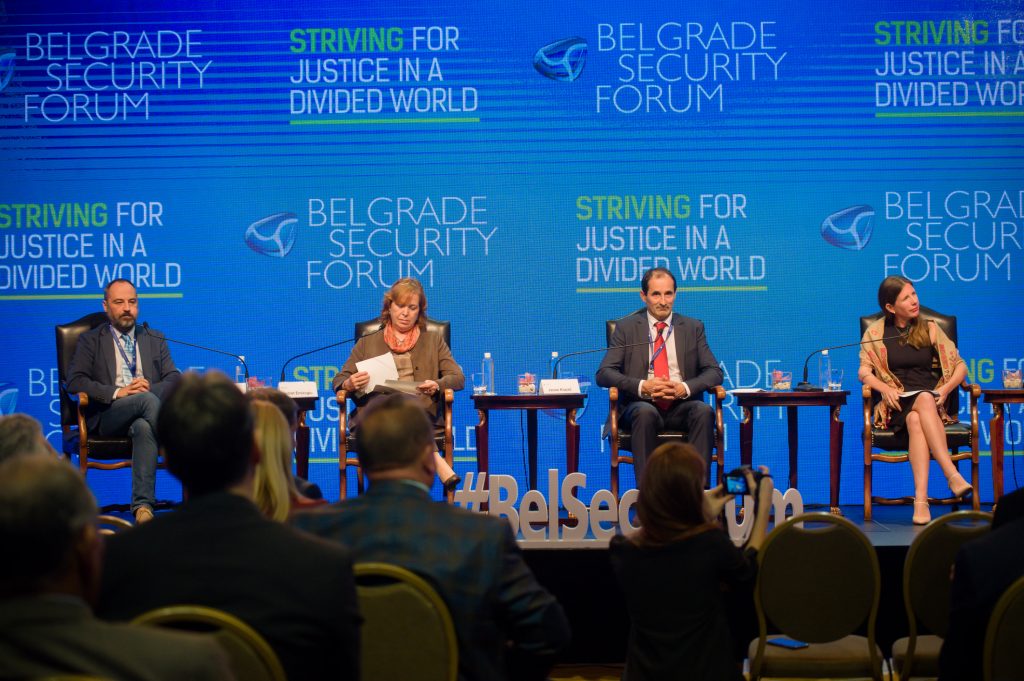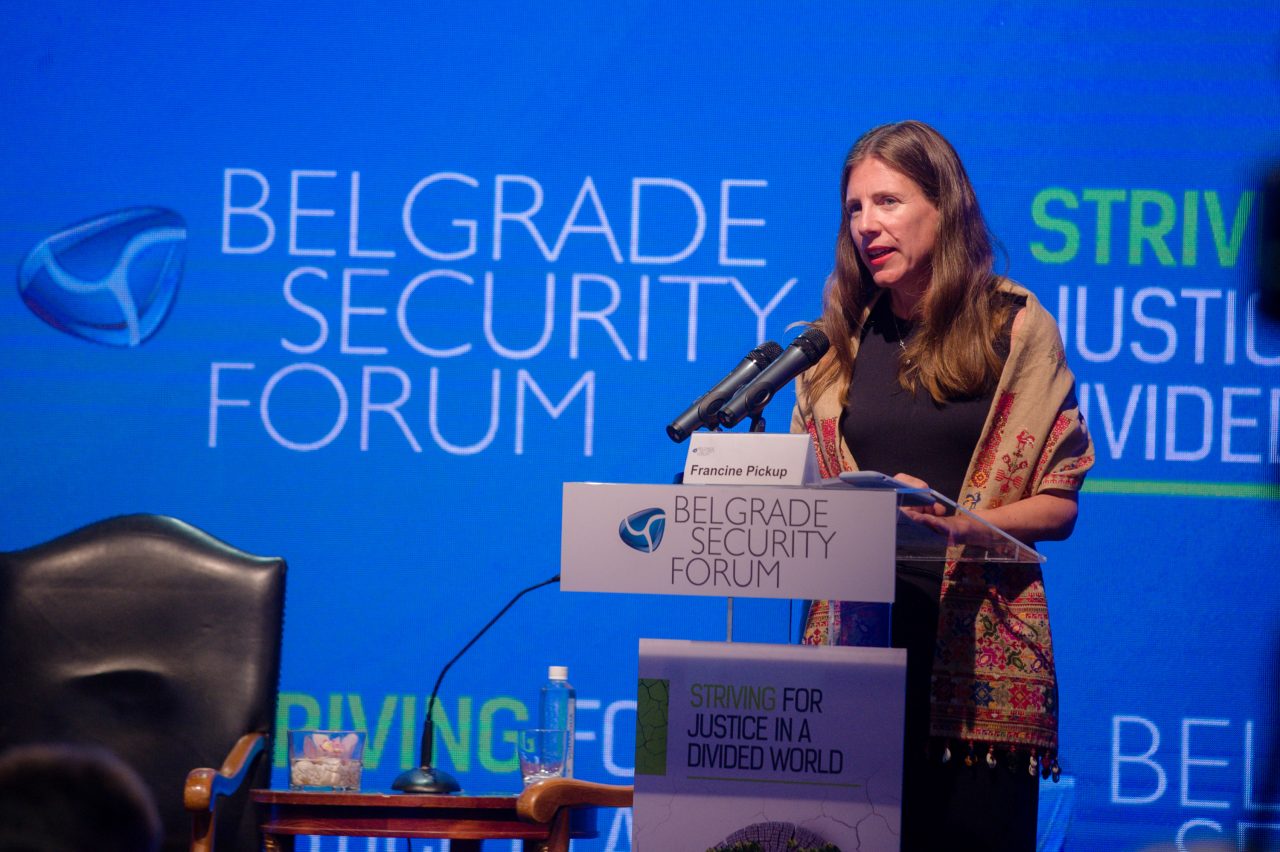-
Oct 19 2019 Climate Change Was One of the Most Important Topics of the 9th Belgrade Security Forum
The climate on Earth is changing rapidly and radically. The intensity of extreme weather events – heatwaves, forest fires, floods and droughts, have increased in the past 50 years. These occurrences have happened before, but on average once a decade, and today they occur every year or even several times a year. With the current average global temperature increase of approximately 1°C above the pre-industrial levels, it has become evident that we cannot reverse global warming during our lifetime. What we can is to stop global warming at 1.5-2 °C warmer than before pre-industrial level. These are the boundaries of what we, as a species, can adapt to. Weather conditions have already made people’s lives impossible in many places on the planet. Only in 2018, 17.2 million people have been displaced by climate-induced disasters in 148 countries and territories around the world.
The impact of climate change on security policy and economic and social development was the topic at the 9th Belgrade Security Forum, held from 16 to 18 October. At the panels “Climate Security: Adaptation, Mitigation, Change” and “Socio-economic Aspects of the Impact of Climate Change in Serbia” UNDP experts as well as experts from various fields of research and work that covers climate change discussed on the topic.
UNDP Resident Representative in Serbia Francine Pickup underlined that cities have a key role to play in fighting climate change, which is why at the recent UN Climate Change Summit in New York, leaders of states, private sector and civil society have launched numerous initiatives to transform cities into energy-efficient, inclusive and sustainable places to live. At the Summit, the youth took the front and center stage and sent a clear message that we are responsible for taking action immediately.
„More than half of the world’s population lives in cities and two-thirds will live in cities by 2050. Cities also produce more than 70 per cent of the world’s greenhouse gas emissions (GHG) and use 80 per cent of the world’s energy. They are the places where the effects of the climate emergency are already severely felt, particularly amongst the most vulnerable populations”, explained Pickup.
Serbia’s Minister of Environmental Protection Goran Trivan spoke about activities taken by Serbia to reduce GHG emissions and create climate-resilient urban communities.

„The Ministry is working to establish an institutional, legislative and strategic framework to fight climate change. This implies the adoption of the Draft Law on Climate Change, which will serve as a basis for encouraging many activities. Also, a Draft Climate Change Strategy with an Action Plan has been prepared, which will determine the direction of low-carbon development and the path to reducing greenhouse gas emissions through specific mitigation measures. It is already evident that our ambitions to reduce GHG emissions under the Paris Climate Agreement will increase two to three times compared to 2015. In addition, as part of the revision of the Nationally Determined Contributions, Serbia will elaborate the aspect of adapting key economic sectors to the expected climate change, primarily in agriculture, water management, forests but also natural resources and public health protection“, explained Minister Trivan.
He recalled that, according to the data of the Statistical Office of the Republic of Serbia, 60 per cent of the population lives in cities in Serbia. However, this percentage will increase, as well as effects on the quality of life. Communities are expanding, but green spaces are decreasing. The number of vehicles on the streets, the amount of municipal waste and wastewaters and air pollution will increase as well as the consumption of energy for heating and cooling. All of this has the effect of increasing and intensifying the impact of climate change.
Associate Professor at the Meteorology Group at the Faculty of Physics, University of Belgrade, Vladimir Đurđević, pointed out the dangers and proportions of damage that global temperature rise of more than 2 degrees Celsius could bring.
“Our functioning on the planet depends on maintaining a stable climate. We are now outside the thermal optimum, but if we keep the temperature rise below 2 degrees, we could adapt to the changes that it brings. If we go above 2 degrees, the economy will be in a serious decline and we will trigger the so-called turning points in our climate system. A 1 degree increase in temperature has lasted for more than 100 years, while a new 1 degree increase will occur in just 30 years”.

Đurđević stressed that we can expect a decrease in rainfall during the summer and therefore intense droughts. He noted that the last couple of years have seen 5 heat waves during the summer, unlike the previous decades, and that torrential city floods are much more risky because of the infrastructure that is built for stable weather.
The World Health Organization Data from shows that climate change also causes numerous health problems. Director of the Regional Office of the World Health Organization for Europe Nedret Emiroglu believes it is important to raise awareness about the impact of climate change on health and find new solutions as the intensity and frequency of communicable diseases increases.
Human health is also endangered by the coal-based energy production. Director of the Energy Community Secretariat Janez Kopač recalled that the entire Western Balkans region is significantly dependent on coal-fired power plants:
„One of the solutions would be installing filters in the power-plants, as well as introducing tax for CO2 emissions, as they do in the rest of European countries. That way air pollution and overall environmental contamination would reduce, but the problem of implementing these solutions comes down to absence of political will in the region“.
Significant initial investments are needed to strengthen the resilience to climate change, but if nothing is done – costs will only rise, said Portfolio Manager for Climate Change in UNDP Serbia, Miroslav Tadić. He recalled that Serbia has lost about six billion dollars in floods and droughts since 2000 through damage:
“For that money, we could build, for example, the necessary facilities for wastewater treatment and water supply in accordance with EU standards”.
Tadić concluded that investing in mitigation and adaptation is at the same time an opportunity for further development of the economy, new jobs and economic progress of the society.
“The consequences of climate change will be there, no matter if we approve or disapprove of its existence. Residents of urban and rural areas will be equally threatened by the effects of climate change, only in different ways”, said climate change expert in Serbia Danijela Božanić.

The panellists noticed that Serbia has signed and ratified vital agreements on climate change and climate protection, but that there is no adequate implementation of these agreements in practice. Experts agreed that waste management, recycling and investment in scientific research, combined with joint regional and international efforts, should be the key priorities.
The panel “Climate Security: Adaptation, Mitigation, Change” was supported by the United Nations Development Program (UNDP) and participated by UNDP Resident Representative in Serbia Fransine Pickup, Minister for the Environmental Protection Goran Trivan, Associate Professor in the Meteorology Group at the Faculty of Physics University in Belgrade Vladimir Đurđević, Director of the World Health Organization (WHO) Regional Office for Europe Nedret Emiroglu and Director of the Energy Community Secretariat Janez Kopač.
The panel “Socio-economic Aspects of Climate Change Impact in Serbia”, also held in partnership with UNDP, was participated by UNDP Climate Change Portfolio Manager Miroslav Tadić, Faculty of Mechanical Engineering at University of Belgrade Aleksandar Jovović, Associate Professor in the Meteorology Group of the Faculty of Physics at University of Belgrade Vladimir Đurđjević, Climate Change expert Danijela Božanić and Team Leader on Resilient Development in UNDP Serbia Žarko Petrović.


